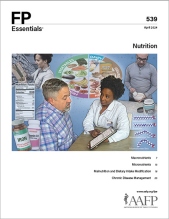
Eating is a universal pleasure. Meals bring us together; the act of sharing food is a symbol of friendship and an indication of peace in many cultures around the world. It also is an essential part of life. Like sleeping, eating is a necessity. Yet when something is both critical and feels good, it can be a challenge to get just enough—but not too much—of that nice thing. In modern life, sleep is too often deprioritized in favor of other choices, such as family time, work, or charting. Food, however, is too often prioritized! We are a nation of food consumers.
This edition of FP Essentials tells us the difference between processed and ultra-processed foods. Processed foods are regular, whole foods that have been cooked or transformed in some minimal way. Ultra-processed foods, as the name suggests, have been substantially changed, often in mass-production factory settings. These foods are higher in sodium, sugar, unhealthy fats, and simple carbohydrates than whole or processed foods—and they are highly palatable as a result. They also are nutrient-poor. For each calorie of energy consumed, ultra-processed foods provide little nutritional reward.
Ultra-processed foods are easy to package, are shelf stable, and can be transported long distances in trucks. This means they often are cheaper than whole foods. Multiple studies have shown that calorie for calorie, ultra-processed or other calorie-dense foods are cheaper than whole foods, which may contribute to a range of health disparities.1,2
The authors of this edition counsel us to avoid ultra-processed foods in favor of nutrient-dense foods. They also discuss several dietary patterns that focus on whole foods: the Mediterranean diet, the Dietary Approaches to Stop Hypertension (DASH) diet, and the Portfolio diet, among others. These eating plans can be useful in management of chronic medical conditions and have been shown to reduce the risk of coronary vascular disease. Generally speaking, eating better is better for us.
Section Three covers malnutrition and meal replacement products, and this section notes indications for consumption of such products. Meal replacement shakes and bars contain more macro- and micronutrients than most other ultra-processed foods, but are still processed, mass-produced products. For patients who struggle to gain weight and need supplementation or for patients undergoing medically supervised weight loss, consumption of these products may be indicated rather than discouraged.
I hope this edition of FP Essentials helps you sort out the sometimes confusing role of nutrition in medicine.
Kate Rowland, MD, FAAFP, Associate Medical Editor
Vice Chair of Education and Associate Professor,
Department of Family
Medicine Rush University, Chicago, Illinois
